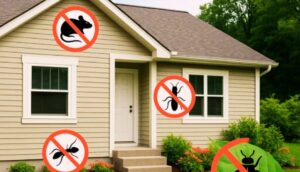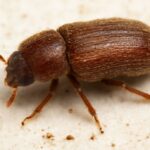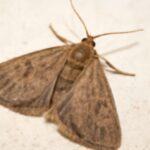How to Get Rid of Raccoons

Raccoons are nocturnal being most active during the night hours although they can be spotted during day time, these little critters are agile and very intelligent. Their natural habitat includes ponds, wooden areas near streams, mashes, and dense clumps of cattails. Still, they can also be found around agricultural areas making their dens in rock crevices, tree cavities, brush piles, abandoned fox burrows or woodchuck, sheds, haystacks, attics, underneath porches, and chimneys.
Raccoons invade yards and garden areas searching for food, shelter, water, and a place to raise their young, they can destroy vegetable gardens in no time even causing great damage, especially to newly installed lawns digging for grubs and worms. Raccoons can also destroy beautifully designed flower beds unearthing plants while searching for grubs.
Because raccoons are omnivores they can be a nuisance by removing trash from your trash cans looking for edible plant and meat scrapes. If you are having issues with raccoons, continue reading to find out how to get rid of them.
Signs of Raccoons
Here are some signs to look for if you suspect raccoons are in your yard or garden.
- Scratches on your trees
- Signs of trash cans that are turned over or trash on the ground around trash cans
- Distinct five-toe paw tracks
- Fish missing from a water garden or fountain
- Scratches on your fence
- Fecal droppings because of feeding or urine
- Tubular droppings near the bottom of trees
- Tubular droppings can also be found on woodpiles and logs
- Nesting material
- Scratching or scurrying noises
- Holes in mulch and lawn
- Pets food bowls that are knocked over with the food scattered
Note: Raccoons are dangerous because they are wild and will cause injury, the first line of defense is to call in the professionals who are trained in the capture and removal of wild animals. Although raccoons are considered cute never under any substances seek to feed them.
13 Ways to Get Rid of Raccoons

1. Use Loud Noises: It is recommended to leave a radio on in your yard or garden and turn up the sound loud enough not to disturb the neighbors but loud enough to keep raccoons at bay because raccoons hate loud noises.
2. The Use of Barriers: Fences, nets, and other barriers can keep raccoons out of your yard or gardens so consider using them.
3. Eliminate Food Sources: Eliminating food sources is a great way to discourage the presence of raccoons, one way to accomplish this is to secure your trash cans. Ensure that your trash can has tight lids. If possible place heavy cinder blocks on top of the trash can lid or try securing your trash can in your shed or garage. Because raccoons have a good sense of smell. Place meat scrapes in a plastic bag and properly seal it.
4. Raccoon Repellent Devices: Many devices have been constructed to keep raccoons at bay, these solar-powered devices have motion detectors that activate a supersonic sound wave that keeps raccoons away.
5. Eliminating Water Sources: Because raccoons are in search of water it’s important to get rid of or secure all water sources, walk your yard and look for water holes or places where water collects and properly seal or cover with dirt. Empty and remove containers that collect water or turn them over.
6. Scarecrows: Scarecrows are an old method that helps to keep birds at bay and they will do the same to raccoons for a while but because these raccoons are so smart they will soon discover that a scarecrow is no threat.
7. Trapping Raccoons: Setting traps for raccoons is another way to remove them from your yard, however, it’s prohibited to kill them once they are caught take them back into the wild, and release them. Be very careful when releasing them because raccoons may attack you out of fear of feeling threatened.
8. Bright Lights and Motion Detectors: Because raccoons are most active during the night hours searching for food install motion-sensor flood lights. Raccoons hate bright light and will try to avoid these lights at all cause. Ensure when placing these lights they shine over your garden and your yard.
9. Secure Bird Feeders: If you have bird feeders secure them or hang them in a way that makes it impossible for raccoons to reach them.
10. Ammonia: Raccoons hate the scent of ammonia, soak a few pieces of rags in ammonia and place rags in areas where raccoons are spotted or where you suspect they are most active.
11. Pepper Spray: The use of pepper spray is a great way to keep raccoons at bay, mix a solution of boiling water and hot sauce or fresh pepper. Let this mixture cool then place it in a spray bottle and apply the solution to the premier of your yard and around trees and garden areas.
12. Block Access to Hiding Places: Because raccoons are nocturnal they will seek out dark places such as crawl spaces beneath porches and decks. Even under the roots of large trees, they will also take cover in bushes that are thick enough to hide. Use a barrier to block these hiding places, thick bushes should be thinned out or removed, removing all debris and keeping your yard clutter-free will help to reduce the hiding places of raccoons.
13. Treat Your Yard for Grubs: Because raccoons will ruin your lawn looking for grubs, treat your lawn for grubs to keep raccoons away.
10 Frequently Asked Questions (FAQs)
1. What attracts raccoons to my yard in the first place?
Raccoons are mostly drawn to easy meals and cozy hiding spots. Things like open trash cans, pet food left out overnight, fruit trees, compost piles, or even bird feeders can seem like a buffet to them. Remove the temptations, and they’re much less likely to visit.
2. Are raccoons dangerous to humans or pets?
While raccoons aren’t usually aggressive, they can become defensive if cornered. They may also carry diseases like rabies or leptospirosis. It’s best to keep a safe distance and never try to handle one — even if it seems friendly.
3. How can I make my yard less appealing to raccoons?
Start by securing trash bins with tight-fitting lids, cleaning up fallen fruit, and bringing pet food indoors after dark. Also, trim back overgrown bushes and seal off access to attics, decks, or sheds where they might want to nest.
4. Do motion-activated lights or sprinklers really scare raccoons away?
Yes! Raccoons are nocturnal and cautious by nature. Sudden lights or a surprise splash of water can make your yard feel unsafe to them. These deterrents aren’t 100% foolproof but can be a great part of your overall strategy.
5. Will strong smells keep raccoons away?
Absolutely. Raccoons dislike the scent of ammonia, vinegar, cayenne pepper, and even peppermint oil. Soaking rags or cotton balls in these scents and placing them around trouble spots can act as a mild deterrent — just reapply often, especially after rain.
6. Is it okay to feed raccoons if I enjoy seeing them?
Feeding raccoons might seem harmless or even fun, but it can cause them to lose their natural fear of humans and become a real nuisance — or worse, aggressive. It’s best to enjoy them from afar without offering snacks.
7. What should I do if a raccoon is living under my deck or shed?
If you suspect a raccoon has taken up residence, avoid sealing the entrance right away. You might trap babies inside, which creates a whole new problem. Instead, try gently encouraging them to leave using light, sound, or smell — or call a wildlife removal professional if needed.
8. Can fencing keep raccoons out of my yard?
A regular fence might not cut it since raccoons are excellent climbers. But adding a roller bar or electric wire at the top can make your fence raccoon-proof. Burying the base a few inches underground can also stop them from digging underneath.
9. Do raccoons come out only at night?
Mostly, yes. Raccoons are nocturnal and prefer to roam when it’s quiet and dark. However, seeing one during the day isn’t automatically a cause for alarm — especially if food is abundant or if it’s caring for young.
10. When should I call a professional for raccoon problems?
If raccoons are tearing up your yard, getting into your attic, or just won’t take the hint to leave, it’s time to call in a licensed wildlife removal expert. They’ll handle things humanely, safely, and legally — especially important if babies or nests are involved.
Conclusion
The presence of raccoons is a sure sign that your yard has something that interests them, following this guide will help to bring raccoon control. You ought not to fear them nor should you allow them to be a nuisance to your life. but caution should be taken because as said earlier these animals are dangerous and if not handled with care can cause injury. Your first action should be to call in the professionals who are highly trained in the capture and release of animals in the wild. If you have a raccoon issue then look no further you have come to the right place that will guide you on complete raccoon control.









